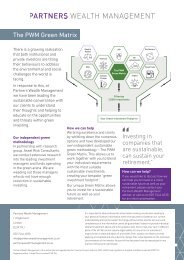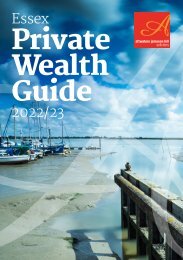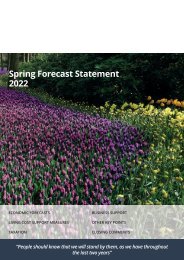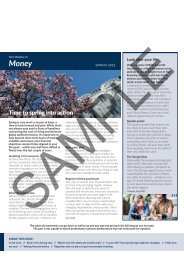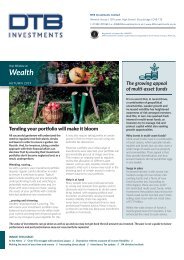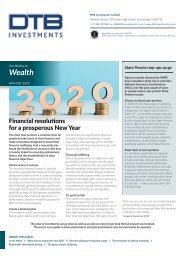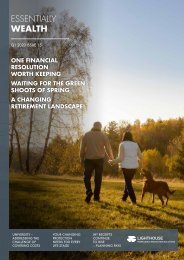You also want an ePaper? Increase the reach of your titles
YUMPU automatically turns print PDFs into web optimized ePapers that Google loves.
AN INTRODUCTION TO<br />
<strong>Domiciles</strong><br />
RESIDENCE VS DOMICILE<br />
WHY IS DOMICILE IMPORTANT?<br />
TYPES OF DOMICILE<br />
RECENT UPDATES
2 An Introduction to <strong>Domiciles</strong><br />
Every year a significant number of<br />
individuals and families relocate abroad,<br />
whether this be leaving the UK or settling<br />
in this country. Whatever clients’ reasons<br />
for moving, there are numerous things to<br />
consider particularly in relation to taxation<br />
and, therefore, your financial planning.<br />
This guide is one in a series providing an<br />
overview of key topics within this area, in<br />
this case particularly focusing on the issue<br />
of domicile status.<br />
Incorrect understanding of your status or failure to properly<br />
arrange your finances from the outset, can have lasting adverse<br />
consequences. In addition, failure to understand the rules and<br />
correctly submit tax returns to HMRC, can result in considerable<br />
fines. For individuals not originally UK domiciled however, explicit<br />
allowances have been present in the UK tax system, aimed at<br />
attracting individuals, talent and investment into the UK.<br />
Since 1914, the concept of domicile and the accompanying rules<br />
about offshore income and assets have been tweaked a number<br />
of times, but very much remain present in HMRC’s rule book.<br />
Having a good grasp of the rules and applying careful planning and<br />
management of your finances can offer significant benefits for<br />
years and potentially generations.<br />
Residence versus domicile<br />
A key consideration for any individual moving abroad relates<br />
to the difference between the terms ‘residence’ and ‘domicile’,<br />
and the impact this has on a person’s potential tax liability. It is<br />
extremely important to know how the two terms differ in order to<br />
fully understand any financial obligations, as making an incorrect<br />
assumption regarding your tax status can ultimately result in<br />
severe financial consequences. However, in practice doing so is not<br />
a particularly straightforward exercise.<br />
What is residency?<br />
For tax purposes, this might have a very different definition to what<br />
you might otherwise assume. In the UK, for example, you can be<br />
considered resident for tax purposes even if you have spent as little<br />
as 16 days in the country. Fortunately, a Statutory Residence Test<br />
has been introduced in the UK, in order to provide greater clarity<br />
for individuals when determining their residence status. More<br />
information on this is available in our UK Residence guide.<br />
What is domicile?<br />
Domicile is a legal concept that refers to the country in which<br />
an individual has, or is presumed to have their permanent home.<br />
It is not the same as nationality, citizenship or residence, and will<br />
not necessarily be the country in which someone was born, or the<br />
country where they are currently living. An individual can change<br />
their domicile when they become an adult, but it is only possible to<br />
have one country of domicile at any one point in time. For some,<br />
ascertaining their domicile may a be a straightforward process,<br />
but for those with connections to more than one country, it may be<br />
more complex and require specific advice.<br />
Why is domicile important?<br />
An individual’s domicile is important because it affects a number<br />
of their rights and obligations. In particular, domicile is used to<br />
determine someone’s tax position including their liability to income<br />
tax, capital gains tax and inheritance tax (IHT), both in the UK and<br />
their country of residence. It also has significant ramifications<br />
in relation to the succession of assets, and could, therefore,<br />
determine how an individual’s estate is passed on in the event of<br />
their death, particularly if they own property or financial assets in<br />
foreign jurisdictions.<br />
Domicile of origin<br />
Everyone is automatically assigned a domicile at birth which,<br />
if their parents are married, will typically be the country their<br />
father considered to be his permanent home when the child was<br />
born. If their parents were not married, they may acquire their<br />
mother’s domicile, although this can vary depending on individual<br />
circumstances. This is known as a domicile of origin and will<br />
continue unless a new domicile is acquired. Even if someone<br />
moves abroad, their domicile is unlikely to change unless specific<br />
actions are taken to do so. Until the age of 16, a child’s domicile will<br />
remain dependant on their relevant parent.
An Introduction to <strong>Domiciles</strong> 3<br />
Domicile of dependence<br />
Before the Domicile and Matrimonial Proceedings Act 1973, married<br />
women’s domicile followed their husbands, however, they are now<br />
determined independently.<br />
Domicile of choice<br />
After the age of 16, an individual who goes to live in a foreign country<br />
can change their domicile provided they satisfy a number of criteria<br />
and are able to provide evidence of each one. The criteria for changing<br />
to a domicile of choice are varied but, as an absolute minimum, will<br />
require someone to be physically present in that country and have a<br />
fixed and settled intention to live in the new location permanently or<br />
indefinitely. Each case is judged on its personal merit but changing<br />
domicile of origin is not easy, partly because the standard of proof<br />
that is required to establish a domicile of choice is extremely high.<br />
UK resident non-domiciled<br />
An individual might therefore be UK resident for tax purposes, but not<br />
necessarily UK domiciled. If they retain a foreign domiciliary, they can<br />
elect to be taxed in the UK on a different basis, such as only being<br />
subject to tax on UK situs assets or UK derived income. Therefore,<br />
there may be benefits for those with substantial non-UK assets and in<br />
our Remittance Basis guide we look at using the remittance basis of<br />
taxation which is an option available to non-domiciled individuals.<br />
Other benefits might include the ability to exclude foreign property<br />
from UK IHT, and the potential to utilise planning options such as an<br />
Excluded Property Trust (EPT).<br />
Deemed domiciled<br />
A further complication for individuals who are long-term UK resident<br />
non-domiciles, or for British expats, relates to the concept of deemed<br />
domicile. We previously established that an individual can only hold<br />
one domicile at a time, however, UK legislation created the concept of<br />
being ‘deemed domicile’. If applied, this deems the individual<br />
to be UK domiciled for UK tax purposes. This might be<br />
the case even if the individuals true domicile remains<br />
unchanged. In other words, even if someone is not domiciled<br />
in the UK, HMRC can still treat them as UK domiciled if they<br />
fall with certain rules such as:<br />
• you were domiciled in the UK within the last three years; or<br />
• you were resident in the UK for at least 15 out of 20<br />
UK tax years.<br />
* Seeking expert advice is essential to<br />
maximise tax efficiency and ensure you are<br />
We’re here to help<br />
not inadvertently missing opportunities, or<br />
incorrectly reporting your circumstances. We<br />
are on-hand with the knowledge and experience<br />
to help clients with a range of international<br />
and multi-jurisdictional needs. To discuss your<br />
circumstances, contact Head of International,<br />
Nathan Prior, on 020 7444 4053, or by email,<br />
nprior@partnerswealthmanagement.co.uk.
4 An Introduction to <strong>Domiciles</strong><br />
Latest update<br />
We recommend that your personal circumstances and planning<br />
is regularly reviewed as rules do change over time. The latest<br />
significant changes were announced in 2015 and came into effect<br />
on 6 April 2017. Possibly the most significant was the reduction of<br />
years needed to trigger the ‘deemed domicile’ rules from 17 out of<br />
20, down to just 15 out of 20. Not only does that mean you become<br />
deemed domicile quicker, it also means that it takes more than five<br />
years to lose this status.<br />
The other notable changes were that returning expats with a UK<br />
domicile of origin can no longer benefit from non-domicile rules<br />
and become UK domiciled immediately on return to the UK,<br />
even if they had acquired an alternative domicile of choice.<br />
This means that for some, the advice they took some years ago<br />
when leaving the UK may no longer be effective or valid and needs<br />
to be reviewed.<br />
The other item that families should be aware of is the change to<br />
treatment of UK residential property, which is now always subject<br />
to inheritance tax, even if owned by a non-UK domiciled individual.<br />
Additionally, transferring the property to a company or trust is also<br />
unlikely to shield the property from IHT rules and so structures<br />
holding UK residential property should also be reviewed to ensure<br />
they achieve the desired outcome.<br />
Partners Wealth Management<br />
1 Angel Court<br />
London<br />
EC2R 7HJ<br />
020 7444 4030<br />
info@partnerswealthmanagement.co.uk<br />
partnerswealthmanagement.co.uk<br />
It is important to take professional advice before making any<br />
decision relating to your personal finances. Information within this<br />
document is based on our current understanding and can be subject<br />
to change without notice and the accuracy and completeness of<br />
the information cannot be guaranteed. It does not provide individual<br />
tailored investment advice and is for guidance only. Some rules may<br />
vary in different parts of the UK. We cannot assume legal liability<br />
for any errors or omissions it might contain. Levels and bases of,<br />
and reliefs from, taxation are those currently applying or proposed<br />
and are subject to change; their value depends on the individual<br />
circumstances of the investor. No part of this document may be<br />
reproduced in any manner without prior permission.<br />
Partners Wealth Management LLP is authorised and regulated by the Financial Conduct Authority FRN: 442303 and registered in England and Wales under No.OC307751.<br />
Registered office: 1 Angel Court, London EC2R 7HJ.






